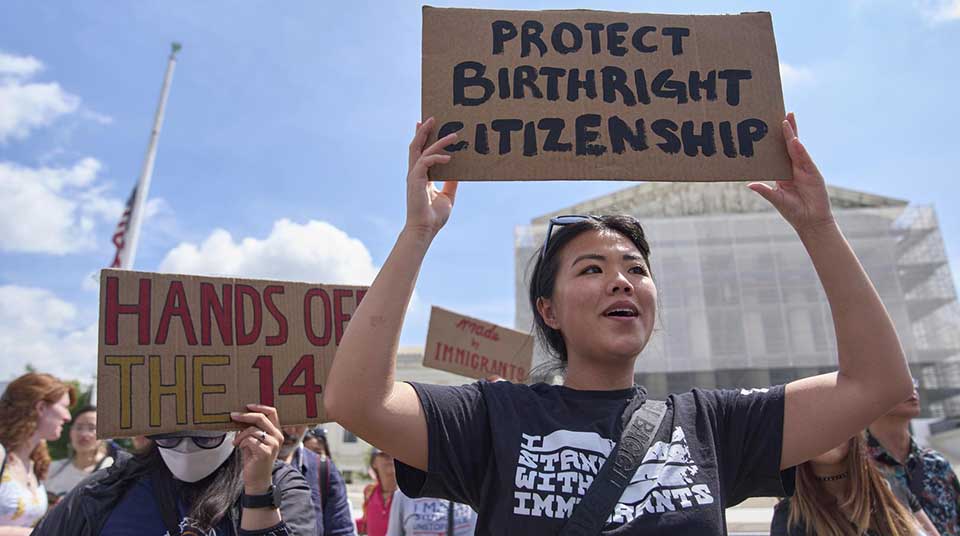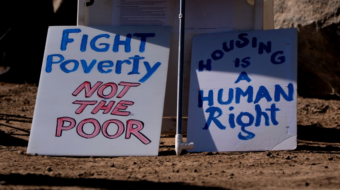
WASHINGTON—As demonstrators here demanded the Supreme Court uphold the U.S. Constitution against Donald Trump, progressive justices Ketanji Brown Jackson and Sonia Sotomayor hit Trump’s lawyer with the same demand inside the chamber—but in more polite language.
In a May 15 session that lasted more than two hours, Justices Jackson and Sotomayor challenged Trump’s Solicitor General, D. John Sauer, about the constitutionality of a Trump executive order yanking what the right-wing sneeringly calls “birthright citizenship” from millions of people.
Sauer claimed Trump’s enforcement of his anti-citizenship order has been stopped, like many other Trump mandates, by a nationwide injunction from one U.S. District Court judge. Justice Sotomayor brought him up short by noting there have been four injunctions against this Trump edict alone.
As the justices inside–and even more so the demonstrators outside–noted, this Trump diktat flies directly in the face of the plain language of the Constitution’s 14th Amendment.
As the opening phrase of that post-Civil War amendment says: “All persons born or naturalized in the United States, and subject to the jurisdiction thereof, are citizens of the United States and of the state wherein they reside.”
Few exceptions, no ifs, no ands, no buts, said speakers outside the court. Justice Sotomayor and a speaker outside cited four High Court pro-citizenship rulings stretching all the way back to 1898. As Justice Sotomayor told Sauer, Trump’s executive order defies all of them.
Left unsaid inside the High Court: The people who would lose the rights and privileges of being U.S. citizens, born or naturalized, would be Black, like Justice Jackson, or brown, like Justice Sotomayor. And that’s intentional on the part of Republican white nationalist President Trump.
The crowd outside included many members of CASA de Maryland–whose staff is unionized with the Washington-Baltimore News Guild and a contingent from Service Employees Local 1199 of New York. They welcomed both individual speakers and several lawmakers, including Rep. Jamie Raskin, D-Md., a constitutional law professor on leave.
“An executive order does not trump federal law,” Raskin declared. “An executive order does not trump the Constitution of the United States. The Constitution trumps Trump.”
One of the four judges who have ruled against Trump’s order, named by GOP President Ronald Reagan, called it “the most unconstitutional executive order he’s ever seen,” Raskin added. “In 1898, somebody tried to do what Donald Trump is trying to do, and the court rejected that.
“It decreed that everyone born in the U.S. is a citizen of the U.S.”
The demonstrators also directed their chants, their signs and even a song, Bruce Springsteen’s “Born in the USA,” not just at the court, but at Congress right across 1st Street N.E. There, inside the Capitol, ruling Republicans promote legislation writing Trump’s order into law, while the Democratic minority backs one bill outlawing his citizenship ban and another declaring “Trump is not a king.”
“This is insane. They’re voting against their own constituents,” Katia Guillaume, Home Care Vice President for SEIU1199, told People’s World, referring to the GOP. “They are beyond heartless and callous.”
“Somebody who wants absolute power doesn’t want it in a limited way,” warned Bill Liss-Levinson, an ex-New Yorker now living in D.C. “This is a classic playbook we’ve seen before.
“Although we’re here in front of the Supreme Court, we’re also directing the message to Congress and the president.”
More than just words on paper
And citizenship is more than just words on paper, Melanie Mechucha of labor-backed Make The Road New Jersey told the crowd. She’s seen the difference in her own family.
“Birthright citizenship is not about just legal status, but it’s about safety and opportunity,” Mechucha explained. “I can seek health care when I need it, and I can speak with my voice. I am a citizen.”
But because Mechucha’s mother is undocumented, her two older brothers are, too. “They live in fear,” she said. “The 14th Amendment shields me, but not my siblings.”
Nevertheless, with congressional Democrats in their corner, marchers must convince the lawmakers to lobby their Republican colleagues to defy Trump and defect from the party line, Guilliame said.
After all, she pointed out, linking citizenship with federal dollars, the workers who will get hurt by the Trump-GOP huge Medicaid cuts, now embroiled in hot House debate, are women of color who Medicaid pays to provide home health care to the ill and the elderly.
A similar anti-Trump protest in San Jose, Calif., drew 300 people, the Mercury-News reported.
Those marchers opposed stripping people of citizenship, opposed Trump’s deportations, and opposed Trump’s plan to end Temporary Protected Status. That program has admitted more than 532,000 immigrants from Cuba, Nicaragua, Venezuela, and Haiti, fleeing famine, wars, and violent gangs.
Inside the court chamber, Sauer tried to make a case for Trump’s executive order, saying the 14th Amendment’s “citizenship clause related to former slaves, not to illegal aliens, who weren’t even a discrete class at that time.”
Contrary to the false picture painted by the Trump lawyer, massive immigration of people who were not enslaved was happening in the latter half of the 19th century when, for example, millions fled famine in Ireland and oppression and poverty in Eastern Europe with huge numbers of immigrants from those countries flocking to the United States. Discrimination against the immigrants was rampant, with signs going up at workplaces in Boston and New York that read “NIRA,” meaning “No Irish Need Apply.” The courts were well aware, at the time, then, that the 14th Amendment was applying to many people other than just the formerly enslaved. It begs the question: If Trump were alive at the time in New York, would he have railed against citizenship rights for the U.S.-born children of the Irish and other immigrants?
The Trump lawyer later repeated to Justice Sotomayor the same argument about the 14th Amendment applying only to the formerly enslaved. She jumped on him.
“The president is violating an established–not just one but, by my count, four established Supreme Court precedents. We have the Wong Ark case, where we said fealty to a foreign sovereign doesn’t defeat your entitlement. Your parents’ fealty to a foreign sovereign doesn’t defeat your entitlement to citizenship as a child.
Another case
“We have another case: she noted, “where we said that even if your parents are here illegally, if you’re born here, you’re a citizen. We have yet another case that says, even if your parents came here and were stopped at the border, but you were born in our territory, you’re still a citizen. And we have another case that says, even if your parents secured citizenship illegally, you’re still a citizen.”
While sticking to his stand, Sauer then suggested one potential compromise, which caught the attention of several of the GOP-named six-justice majority. Sauer declared individuals could sue for their rights in the courts, or even band together in class action suits, state by state.
That would produce chaos, Justice Jackson replied.
“Your argument seems to turn our justice system into a ‘catch me if you can’ kind of regime from the standpoint of the executive, where everybody has to have a lawyer and file a lawsuit in order to stop the government from violating people’s rights. I don’t understand how that is remotely consistent with the rule of law,” she said.
And Jackson, the only justice who ever served as a public defender, noted that in such cases, defendants who couldn’t afford a lawyer would be out of luck.
Jeremy Feigenbaum, the lawyer for the states and cities challenging Trump’s order, summarized their case—and the case against alternatives, such as class-action suits—for Justice Samuel Alito. The justice had just noted the U.S. has 680 federal district judges, and they all can’t be right all the time.
“Sometimes, you are going to have cases where you describe the state’s own injuries” against defendants, such as people whom Trump wants to declare non-citizens. “The alternatives are not practically or legally workable. And that describes this case perfectly,” Feigenbaum said.
Kelsi Corkran, attorney for 17 citizens who challenged Trump’s order on their own, was emphatic against letting the cases involving millions of Black and brown people, faced with Trump’s threat to strip them of citizenship, wind their slow way through clogged courts. Kill his threat, Corkran said.
Rejecting Trump’s dictate would “prevent the catastrophic consequences that will result for the plaintiffs and our country if the government is allowed to execute an unconstitutional citizenship-stripping scheme simply because legal challenges take time.”
But it was left to Rep. Pramila Jayapal, D-Wash., a former organizer of migrants, and one of 19 House members who previously immigrated to the U.S., to offer a simple solution. Trump’s moves have now been subject to 250 court cases nationally, with Trump losing 154 times, said Rep. Raskin.
Trump is “challenging the ability of federal judges to issue national injunctions” against his edicts, Jayapal explained.
“Well, if you don’t like the national injunctions against the Trump administration, then stop doing illegal, unconstitutional stuff.”











